Editor’s note: Some names have been changed or withheld to protect people’s privacy.
Asheville is a city full of transplants that loves to celebrate its diversity. Yet the area’s third-biggest immigrant population goes mostly unnoticed.
In recent decades, thousands of Eastern Europeans from Russia, Ukraine, Moldova and other countries have made their way to the U.S. seeking religious freedom, economic opportunities and the American dream.
Over time, some have settled here, bringing with them their various spiritual beliefs, traditions and cultures even as they worked to learn a new language and adjust to a vastly different culture. United by faith, family ties and a desire to succeed, members of this seldom-seen community continue that assimilation today.
And as their children come of age, they’re finding their place in mainstream America, weaving their distinctive heritage into the region’s overall cultural mix.
Counting heads
According to the Census Bureau’s 2013 American Community Survey, 1,183 people of Eastern European descent live in the Asheville metropolitan area.
Most are Moldovans or Ukrainians — about 450 of each — while smaller numbers hail from Russia (185), Poland (42), Belarus (26) and several other countries. Together, they constitute by far the area’s largest European immigrant population, trailing only residents from Central and South America.
Within the city limits, residents of Russian descent tend to live in east and southeast Asheville, according to the website zipatlas.com. Ukrainians, meanwhile, are concentrated along the city’s western edge.
“In 2014-15, 13 percent of our students were Eastern European,” says Erin Sebelius, ESOL director for the Literacy Council of Buncombe County. “The vast majority are from Ukraine, with a few from Moldova, Belarus and Russia.”
Despite a significant language barrier, Sebelius says these immigrants’ generally high educational level helps smooth their transition.
“Most of our Eastern European students come to us with at least a high school diploma, and many have two- or four-year college degrees,” she notes. “Plus, [many] are already bilingual, which makes learning English easier.”
The Literacy Council’s lessons, Sebelius explains, are set in the context of daily life skills. That helps students assimilate in the workplace, access health care and other community resources, and apply for U.S. citizenship, which many eventually do.
Sebelius describes her Eastern European students as “mostly very religious, very conservative socially and politically,” placing a high value on learning English.
Despite their homelands’ geographic proximity, however, these immigrants represent diverse cultures, each with its own unique characteristics.
Spiritual bonds
Like many of these residents, Igor and his family didn’t initially settle in Asheville. In 1994, he explains, “We moved to Pennsylvania, since my mom’s aunt lived there.”
They soon relocated to Asheville, drawn by a small community of Slavic people, mostly Russian and Ukrainians. Igor’s family, however, were the only Moldovans, a non-Slavic culture. Before long, though, more of his relatives joined them.
“My mother sponsored her two brothers,” he explains. “They moved here in 1998 with their families.” Within the next few years, his uncles had helped their wives’ families make the journey as well. “Thus started our small Moldovan community,” notes Igor. “My aunt’s siblings invited over their in-laws and so forth, until we got to where we are today.”
Over the next decade, the Moldovan community grew to include more than 100 families, with a culture that he says is “heavily grounded in our religion.” In 2013, they established their own church.
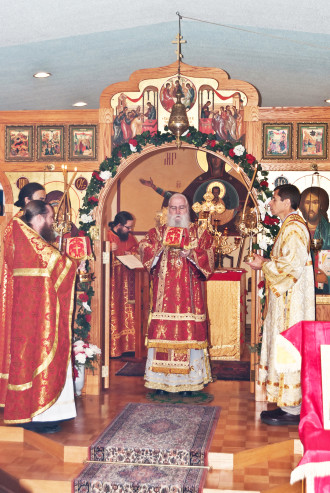
After that, “We somewhat distanced ourselves from the Slavic community.” Moldovans, he explains, are descended from the Romans and Italians. “Our language is very similar, and our culture is somewhat as well.”
Religion has played a crucial role in many Eastern Europeans’ decision to move to WNC. Many of those families attend one of several local Slavic-based churches, either Pentecostal or Russian Orthodox.
Tucked away on a sleepy side road about a mile from the airport, St. Nicholas Orthodox Church is emblematic of the faith that guides these immigrants’ daily lives.
The church was built in 1995, but the congregation quickly outgrew it, the Rev. Steven Webb explains. A new church was erected next door in 1999; the original structure is now used as an auxiliary gathering space.
“I was raised Protestant but later in life began studying Eastern philosophy, particularly nondualism,” says Webb. “I began to search out this topic in the context of Christianity, and it led me to Orthodoxy, which spells out in detail how to achieve this oneness.”
Russian Orthodox churches contain few pews. Parishioners physically able to do so stand during most of the service. Upon entering the main hall, they move around the room, kissing the hands of the icons displayed on walls and tables, lighting candles and making the sign of the cross.
This, says Webb, is meant to honor the Father, Son and Holy Spirit. After making the circuit three times, parishioners take their places, men on one side, women and children on the other. Children aren’t required to sit still, and many can be seen actively participating in the ceremony.
Much of the service resembles a Roman Catholic Mass. But Russian Orthodoxy, notes Webb, has its own traditions, rituals and saints and doesn’t acknowledge the pope in Rome as a higher spiritual being.
“In the Orthodox Church, we have many specific celebrations and feasts throughout the year,” he explains. “In the Russian Orthodox Church, we have even more that are unique to us. These church events are deeply intertwined in people’s family and social life.”
After the service, congregants gather in the hall to share a meal, socialize and discuss upcoming church events. “Hearing their life stories, especially those with family members who were martyrs for their faith in the Soviet Union, has made a deep impression on me,” Webb says. “It’s one thing to read about this in books, but to hear these accounts from people who were connected to it is quite another.”
A look around the room reveals smiling faces, a surprising number of tattoos, long beards and excited children playing around the tables. A young girl comes up to Webb while we eat and excitedly asks about the life of a female saint. Outside, two young boys have untucked their shirts and are chasing each other with Nerf guns. It could be any church gathering in America.
“Slavic peoples seem to be able to embrace living in our modernist America while maintaining an Orthodox lifestyle that’s far older than America itself,” Webb observes. “Through the years, others have come, because we have such a developed community.”
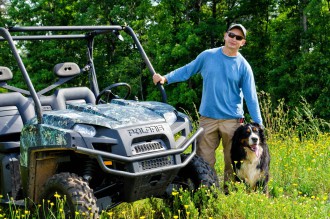
A different life
On this day, Andrey Medvedev, a quiet, unassuming man from Russia, is one of the worshippers. The Moscow native, who operates a 17-acre winery in the rolling foothills of Polk County, has lived in many different worlds. For years, he was an attorney and the vice president of a Russian petrochemical company. In his youth, he served in the Soviet Army in Afghanistan.
“I had many friends die in that war, and many more struggle to come back after,” says Medvedev, who considers his experiences there “the defining moment of my life.” War, he says softly, “is a terrible thing: It is blood and mud and shit.”
That belief also applies to the current conflict between Ukraine and Russia, which Medvedev says is fueled by propaganda from both sides. “I have many good friends from Ukraine,” he notes. “We do not let those things get between us.”
After years in the business world, Medvedev decided to pursue his long-standing dream of owning a winery. “I visited many vineyards in Italy, France and Spain when living in Europe,” he explains.
Originally intending to buy a vineyard in France, Medvedev says he was discouraged by the cost of living and the reception he got there. After attending an equestrian camp in Florida in 2007, Medvedev began looking to the Western Hemisphere to fulfill his dream. Confronting the language barrier was a challenge. “I had studied English for six years, but when I first arrived, I couldn’t understand the accents,” he recalls. “It was like they were speaking Chinese.”
Inspired by friends he’d met at the camp, however, Medvedev visited North Carolina in 2009 and liked what he saw. “It was not as expensive, and there was room for my horses.”
He began attending viticulture classes at the Surry community college in Dobson and bought the Green Creek Vineyards in Columbus. He grows several varieties of grapes, including chardonnay, sangiovese and the native muscadine. Before opening his business in September 2014, Medvedev changed the name to Russian Chapel Hills Winery.
The name isn’t just an homage to his heritage: After acquiring the land, Medvedev set to work building the starkly beautiful St. Anna Chapel on a low rise overlooking the vineyard.
Honoring Russian Orthodox traditions, Medvedev shipped ash wood — traditionally used in 17th-century Russian chapels — over from Europe. The structure contains no nails or screws, relying instead on the traditional groove-cut locking techniques used for generations in his homeland.
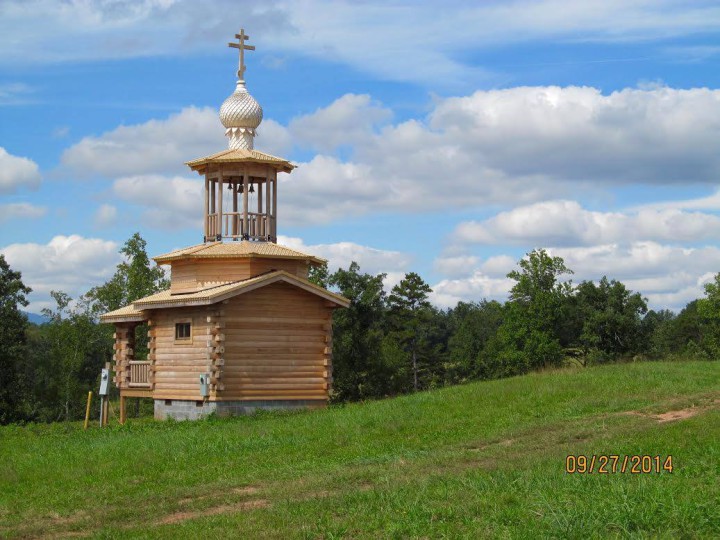
Most importantly, he says, the chapel honors friends lost in the Afghan War. It is actively used as part of the Eastern Diocese of the Russian Church Outside of Russia, and Medvedev had both it and the grapes used for his signature wine officially blessed by a priest. “We’re going to bottle the special Kagor chalice wine that could be used for services in all Orthodox churches,” he says.
Inside the chapel, the sense of solitude is palpable. Icons adorn the simple wooden walls, including a 300-year-old painting donated by a member of the Russian royal family who’s living in Greenville, S.C.
“When St. Anna was opened, this man came to the ceremony,” says Medvedev. “He has a very generous spirit and felt it was important for the painting to be here.”
Medvedev still visits his family in Russia at least once a year; his daughter is studying economics there. Asked to compare his experiences there with his current situation, he smiles and says simply, “It was a different life.”
Land of the free
Although the Slavic churches here have drawn many Eastern European immigrants to Asheville, others come seeking economic opportunity. Vasiliy Lebed moved from Ukraine with his wife and children in 1997.
“When the Soviet Union fell, it was a terrible economy,” says Lebed, who lives and works in West Asheville. “We had just gotten married, and it was so hard to stay on our feet.”
Despite not knowing English, the Lebeds jumped at the chance to emigrate. “It was a long process, but it wasn’t really that difficult,” he recalls. “We had to go to Moscow to get the interview. We brought our applications and a bunch of paperwork with us. After that, we had a medical exam, got the paperwork approved, bought our tickets and went.”
Moving first to Washington state, they immediately enrolled in English classes. Adjusting to American culture was challenging at first, but “when you’re young and full of energy, it’s not that hard,” he says.
Still, high prices made buying a home there impossible, says Lebed. “We did some research and found that in North Carolina, we could afford it.” The family visited friends already living in WNC and fell in love with the area.
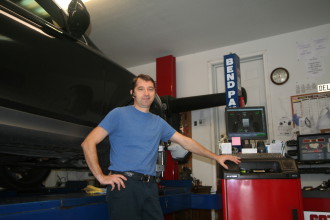
About a year later, they made their move. “We took some time to collect some down payment money, so we’d be ready to buy a house right away.”
In 2001, Lebed began driving a bus for Asheville Transit; his wife went to work at Mission Hospital. Five years later, he opened an automotive service, Swan’s Tire House, in West Asheville. Lebed eventually quit his bus job to focus on his business.
Working out of his garage, he’s continually expanded his offerings and is now looking to move to a separate location and start hiring employees.
The couple’s son is studying to be a paramedic; their older daughter is finishing high school, and the younger one is in first grade. “It’s a busy life, but we’re all happy,” he reports. “We’re very thankful that we can live here and enjoy the freedom.”
Against the grain
For children who were born here or have spent most of their lives stateside, balancing their parents’ traditional culture with the realities of an American upbringing can be difficult.
“Sasha” was 2 years old when her family emigrated from Ukraine. After living in the Midwest, they decided to move to Western North Carolina, drawn by the church community.
“We were religious refugees,” the bubbly teenager explains. “During Soviet times, churches were controlled by the state, forcing many denominations to practice their religion in secret.”
The daughter of a Russian and a Ukrainian, Sasha says her mother was involved in secretly printing Bibles and teaching Sunday school classes. “Even after the Soviet Union fell apart, a lot of people still believed the propaganda and considered [church] bad.” Like many immigrants, they initially confronted cultural and language barriers: “I went into kindergarten not speaking English, so I was very lost.”
Sasha quickly learned the language, however, and her mother “went straight to school to learn English.” Her father is another story. “My dad knows English now, but it’s very shaky,” she says. “He never wanted to fully learn it, because he felt he’s Russian and didn’t need to.”
There are also social differences. “In Ukraine, people are more forward and to the point about things,” she explains. “We don’t smile a lot.” A simple social cue like eye contact “is considered rude, like a challenge. Or if you’re doing it to a male as a female, it’s considered sexual if you do it for too long.”
Even a simple trip to Wal-Mart can include an amusing culture clash. Her mother, says Sasha, “likes to barter and argue about the price of things. I have to tell her, ‘I don’t think that’s going to change.’”
Although both her parents hold college degrees from Ukraine, those credentials didn’t transfer here. “They had to do a lot of custodial jobs at first,” says Sasha. “They didn’t like that, but it was something they had to get over just to survive.”
In her community, she says, men tend to gravitate toward manual labor. “A lot of the Russians are very good with their hands, so they do landscaping, construction, mechanics — it’s respected work and makes you manly.” Others open their own business or take whatever jobs are available, usually custodial work or truck driving.
The latter occupation “makes good money, and you don’t need an education for it,” she notes, though the long absences involved take a toll on families. “A lot of my friends’ dads would never be home: They’d always be gone on those routes.”
For women, balancing the realities of work with their traditional role can be particularly difficult. “It’s shameful if the woman is the breadwinner,” Sasha explains. “Even though it helped our family, we would always have little snide remarks from people.”
Those attitudes, though, are beginning to shift. “The older generation are still rather reserved, but the younger generations make them change,” she notes. “A lot of the older generation doesn’t like it, because they feel like they’re giving up their culture.”
But as Sasha sees it, they can “end up holding on to a lot of outdated beliefs and stereotypes. The funny thing is, if you go to Ukraine or Russia, it’s not at all like it was back then, but the culture here in America is still set in that time.”
Even among young people, however, opinions on social and cultural issues are split. “A lot of the children either try to embrace their culture or wash it off and blend in with American culture.” Gender roles, in particular, continue to be a point of contention: “They still hold a standard to females: You don’t really date around much; you get chaperoned,” Sasha explains. “You have to be a virgin when you get married.”
At an age when the typical American teenager is considering where to go to school or what career path to take, young women in Sasha’s culture are settling down and starting families. “My cousin when she was 18. When my other cousin got married, she was 17. Most of the time, the males get a job and the females just get married and have kids,” she says.
Sasha, though, chose to join the military. “A lot of people frowned upon it, because I’m a girl and because they’re against killing,” she explains. “But mainly it’s because I’m a female doing a masculine type job.”
To Sasha, however, “It’s a good way to give back for the welcome and refuge we got here in America.” Usually, she continues, “The girls are like, ‘I can’t do that.’ I think it’s silly.”
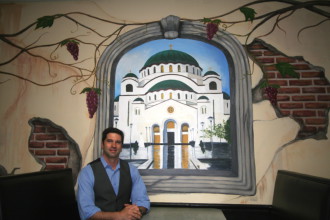
Taste of the old country
“Both of my parents were born in Belgrade,” says Arden resident Aleksandar Stamatovich, whose grandparents came to New York City from what is now Serbia, seeking political asylum from the communist regime there. “My mom came over when she was 6; my dad was 13.”
In New York, Stamatovich’s paternal grandfather opened a successful butcher shop and hotel; his maternal grandfather operated a shop for stamp collectors. His parents met while his father was working at the Serbian Orthodox Church in New York. “My mom and her family were eating there, and my dad gave them the utmost VIP service in an attempt to take my mom out and win my grandfather’s approval.”
Stamatovich was raised in Charlotte, where his parents moved during the 1980s. He moved to Asheville in 2004 to open 32° Ice Bar Lounge and Acropolis Pizza. “My parents come up here at least two to three times a month,” he reports. “I go down and visit them a lot, and my brothers live down there as well.”
In addition, he continues, “We still have family in Serbia. In fact, I just got a Facebook text from them the other day.” Stamatovich, who speaks Serbian, says, “I’m able to brush up on the language every time I go, especially in the smaller towns where they don’t speak any English.”
A member of St. Nicholas Church, Stamatovich says faith plays a central role in his life. A mural adorning one wall in his restaurant depicts the Cathedral of St. Sava in Belgrade, one of the world’s largest Orthodox churches. “I wanted to show my family roots, and if people ask about it, I get to explain what it means to me and more about Serbian culture.”
That includes the food. “There’s a lot of cooking in our culture,” he explains. “When you go to a family’s house, you have to eat: That’s part of the tradition. If you turn down the food, you’re in trouble.”
Stamatovich says he’s started incorporating traditional Serbian dishes such as “yulo” burgers (a mixture of lamb, beef and pork) and the popular “gibanica” (layers of phyllo dough, eggs, feta and cottage cheese) into his regular menu. He’s also offering other items such as “sarma” (ground beef rolled up into cabbage) and “pasulj” (bacon-and-bean soup) on a seasonal basis. “We’re going to try it out as specials,” he explains. “If it goes well, we’ll put it on the menu permanently.”
Staying grateful
For older immigrants, says Lebed, “It’s easy to appreciate when you have something in your life before, and now your life is different. For our younger generation, it’s so much harder to appreciate what we have in this blessed country: They were born here and never had the big needs and other things my generation had to deal with.”
But it’s essential, he believes, “to remember what we had before and what we have now, because not many countries in the world have [what the U.S. has]. We pray for this country, that it stays like this. We really worry about this country sometimes and the way it’ll go, but can only hope for the best.”



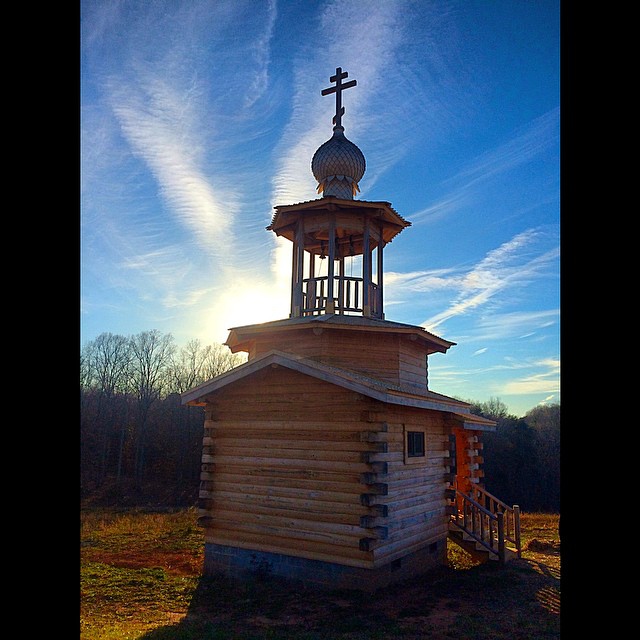


It’s always great to see more international transplants to Asheville. The area has a fairly cosmopolitan culture, but most who have moved here are from other parts of the U.S. I would love to see more folks, especially from Asia and also from Europe and the Middle East, move here, but I think a place like Asheville is not even on the radar of expats, as they naturally gravitate to larger cities.
Great story, and one that could easily be extended to other “hidden” ethnic communities in the region. Two that immediately come to mind are the Micronesians, apparently mostly from Pohnpei and the Marshall Islands, and the Kosovar Albanians, the first of whom arrived as refugees in the late ’90s.
Good thing all of these conservative Orthodox Christians who eat lamb, beef, pork, eggs and cheese got settled here before all of the vicious vegetarian atheist communists began arriving to oppose them. Now THAT’s diversity.